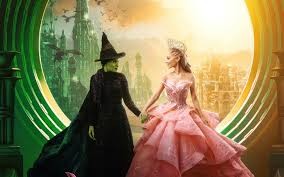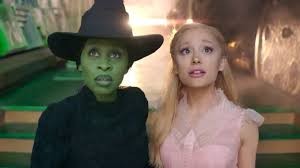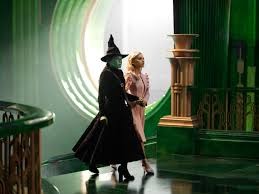Wicked, a musical that has enchanted audiences worldwide, embodies a unique blend of fantasy, friendship, and betrayal. Adapted from Gregory Maguire's novel, it offers an alternative take on the beloved characters of L. Frank Baum's The Wonderful Wizard of Oz. This blend of theater, music, and a powerful narrative has set the stage for a mo...
Wicked
Wicked, a musical that has enchanted audiences worldwide, embodies a unique blend of fantasy, friendship, and betrayal. Adapted from Gregory Maguire's novel, it offers an alternative take on the beloved characters of L. Frank Baum's The Wonderful Wizard of Oz. This blend of theater, music, and a powerful narrative has set the stage for a movie adaptation that promises to bring the magic to a wider audience.
The Origins of Wicked
The story of Wicked began with the idea of reinterpreting the classic tale of Oz through the lens of Elphaba, the Wicked Witch of the West. Gregory Maguire’s novel not only presents a backstory for Elphaba, but it also questions the very nature of good and evil. The complexities of the characters allow for an exploration of themes such as discrimination, friendship, and the consequences of choices.
Conceptualizing the Movie Adaptation
The challenge for the filmmakers lies in capturing the essence of the musical while presenting it in a cinematic format. The musical, with music and lyrics by Stephen Schwartz, features numerous memorable songs like "Defying Gravity" and "Popular." These musical numbers will need to be carefully integrated into the film to maintain the original's spirit while appealing to audiences who may not be familiar with the stage version.
The Casting Choices
One of the crucial elements of any successful adaptation is the cast. As the wrongful reputation of Elphaba and her dynamic with Glinda continues to resonate, casting choices will be pivotal. The roles call for singers and performers who excel in conveying deep emotional arcs. Names like Cynthia Erivo, who is known for her powerfully emotive performances, and Ariana Grande, recognized for her vocal prowess and charm, have sparked conversations about who might embody these iconic roles.
Visual Aesthetics and Worldbuilding
Wicked thrives on its captivating visuals, from the vivid greens of Elphaba to the opulent designs of the Emerald City. Translating these elements from stage to screen provides a rich opportunity for filmmakers to expand on the world that Baum created. Innovative CGI, elaborate set designs, and artistry can bring the fantastical elements of Oz to life in a way that captivates modern audiences.
Music: A Critical Component
Much of the emotional weight of Wicked comes from its music. The rhythmic melodies and powerful lyrics not only advance the plot but also deepen character development. It’s vital that the film adaptation preserves the original score while also potentially introducing new pieces that enhance the narrative. Collaboration with Stephen Schwartz, who has expressed interest in the film, could add a layer of authenticity and nostalgia.
Narrative Depth: Themes and Characters
The complexity of Wicked’s themes, such as friendship, love, loyalty, and societal prejudice, offers a rich tapestry for exploration in the cinematic version. The film can delve deeper into the backgrounds of supporting characters, such as Fiyero and the Wizard, further enriching the narrative landscape. Unearthing these subplots can provide insight into their motivations and their relationships with Elphaba and Glinda.
Social and Political Commentary
At its core, Wicked tackles significant social and political issues, many of which remain relevant today. Themes of exclusion and societal norms challenge audiences to rethink their perceptions of what it means to be ‘wicked.’ By thoughtfully integrating modern-day parallels, the film adaptation could enhance its emotional and political resonance.
The Challenges of Adaptation
Adapting a beloved stage musical into a film is fraught with challenges. Fans of the stage version often have deep attachments to the performances, songs, and visual elements. Maintaining the integrity of the original while bringing fresh perspectives to the story can be a delicate balance. Insightful writing and careful direction are crucial in navigating this transition effectively.
Fan Expectations and Responses
The anticipation for the Wicked movie has generated excited buzz on social media platforms. Fans are eager to see how their favorite characters will be portrayed and the aesthetic choices that will be made. Engagement from the fanbase is vital; therefore, the filmmakers will likely remain receptive to feedback and incorporate their thoughts into the filmmaking process where appropriate.
Production Timeline and Challenges
Films often undergo lengthy production times, with pre-production, filming, and post-production requiring meticulous planning. Unforeseen challenges, such as delays due to global events or logistical issues, can alter timelines. Regular updates about progress can help maintain interest and excitement among fans.
The Role of Technology in Storytelling
Advancements in technology offer filmmakers unprecedented tools for storytelling. With intricate visual effects that bring the enchanting aspects of Oz to reality and advanced sound design that enhances the musical performances, technology will be crucial in defining the cinematic experience. Masterful execution can elevate moments of awe and emotional resonance.
Comparing Stage and Screen: Different Storytelling Mediums
Stage and screen storytelling each have their own unique strengths. The intimacy of live theater allows for a personal connection between actors and audience, while film can capture a wider range of visuals and nuanced performances. Understanding how each medium tells the same story is essential for translating Wicked’s magic to the big screen.
The Impact of Wicked on the Musical Landscape
Since its inception, Wicked has transformed the landscape of musical theater. Its success has opened doors for other adaptations and inspired a new generation of musical theater artists. The film adaptation could serve to amplify the musical’s influence and introduce the story to a whole new demographic, reinforcing its place in the cultural zeitgeist.
Audience Engagement and Community Building
As news and updates about the film begin to circulate, opportunities will arise for audience engagement. Social media campaigns, sneak peeks, and interactive content can help build a robust community around the film. This engagement not only generates excitement but also deepens connections among fans who share a love for the musical's themes and characters.
The Future of Wicked in Popular Culture
Wicked has firmly established itself as a cultural phenomenon, influencing everything from fashion to social discourse. The film adaptation will likely reinforce its relevance, sparking discussions around its themes and messages within contemporary society. As new audiences discover the story, Wicked's impact will only continue to grow.
The Anticipation: Release and Reception
As fans eagerly await the release, conversations about potential plotlines, character arcs, and musical arrangements gain momentum. The ultimate reception will depend on how well the filmmakers honor the original while translating Wicked into a cinematic experience. Excitement builds as the film's premiere is set to take place, giving audiences the chance to witness this beloved tale brought to life in a new, vibrant way.
- Wicked offers a fresh perspective on familiar characters, adding depth and dimension to their stories
- The musical numbers are iconic and resonate emotionally with wide audiences
- The film adaptation has the potential to reach a larger audience than the stage production
- Strong themes of friendship and acceptance provide important social commentary
- The visual effects can elevate the fantastical elements of Oz, enhancing the overall experience
- A star-studded cast can attract fans from diverse backgrounds, broadening the film's appeal
- Adapting a beloved stage musical can lead to high expectations from fans
- Changes made in the adaptation process may alienate long-time followers of the stage version
- The cinematic format may not capture the same intimacy and energy as a live theater performance







